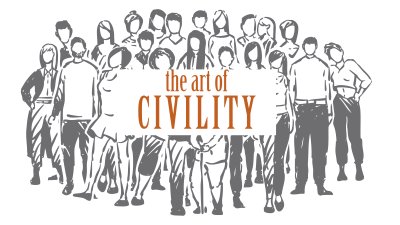


The Art of Civility
Introduction
July 1, 2021
So if there is any encouragement in Christ, any comfort from love, any participation in the Spirit, any affection and sympathy, complete my joy by being of the same mind, having the same love, being in full accord and of one mind. Do nothing from selfish ambition or conceit, but in humility count others more significant than yourselves. Let each of you look not only to his own interests, but also to the interests of others. Have this mind among yourselves, which is yours in Christ Jesus, who, though he was in the form of God, did not count equality with God a thing to be grasped, but emptied himself, by taking the form of a servant, being born in the likeness of men. And being found in human form, he humbled himself by becoming obedient to the point of death, even death on a cross. Therefore God has highly exalted him and bestowed on him the name that is above every name, so that at the name of Jesus every knee should bow, in heaven and on earth and under the earth, and every tongue confess that Jesus Christ is Lord, to the glory of God the Father. ~ Philippians 2:1-11 INTRO The book of James 3:5,9-10 reads: “so also the tongue is a small member, yet it boasts of great things. With it we bless our Lord and Father, and with it we curse people who are made in the likeness of God. From the same mouth come blessing and cursing. My brothers and sisters, these things are not to be so.” How we interact with others is of great importance as we live out the callings that God has given to each and every one of us. I like to call it “The Art of Civility” within our human experience. Civility is defined as “formal politeness and courtesy in behavior or speech.” In many ways, The Art of Civility seems to be a forgotten art in today’s culture. The sheer amount of unfiltered opinions going out on social media platforms, opinion articles, news stations, late night television, radio and our own homes, has led to a culture in desperate need of reclaiming The Art of Civility. Through these studies, we will be using an acronym to guide us into greater amounts of civility in our own lives and this acronym is H.U.R.T. As people we feel hurt when we feel we have not been… Heard Understood Respected Trusted Scripture has this to say when it comes to how we are to speak to one another. Ephesians 4:15: “Rather, speaking the truth in love, we are to grow up in every way into Him who is the head, into Christ.” Civility is not withholding your thoughts, opinions, passions or desires from one another, but it is being able to share those things with a heart of love for the other person. The promise we are given is that as we do this we will all grow up in every way into Jesus who is the head of our body. Paul is speaking here of the Church, the body of Christ on earth, and scripture says that, as Christians, we are to be the leaders of civility in this world. The Art of Civility is not just in how we put our thoughts and opinions out into the world, but also in how we allow others to do the same thing. We do not like to feel HURT and neither does anyone else. Through the next four studies, you will be encouraged, challenged and empowered to reclaim the Art of Civility in your own life and then bring that blessing out into the world. Hebrews 13:20-21: “May the God of peace, who brought back the great Shepherd of the sheep, our Lord Jesus, from the dead by the blood of the eternal covenant, equip you with every good thing to do his will, by developing in us what pleases Him through Jesus Christ. To Him be the glory forever and always. Amen.”
1. HEARD
July 8, 2021
1 {HEARD} “The desire to be heard is as deeply seeded as the desire to be loved. For some people, it doesn’t matter who’s on the other end.” ~ David Levithan “We all like to think that, despite our position in life, we are a ‘somebody’ that matters. We may not be a politician, a celebrity, an academic, etc., but we are here and involved in the world around us and we want desperately to belong. We have a voice and an opinion and crave to be taken seriously. We all want the very same thing…to be heard, to feel like our views matter…that we matter.“ The above paragraph was written by an online writer who had felt he was not being heard on certain social matters. He wasn’t desiring that his opinions be made a reality, but simply that his opinions would be heard and thought about. As Christians, The Art of Civility starts with the invitation that God has given to us to come and talk to Him directly. Listen to this scripture from Jeremiah 33:23: “Thus says the Lord who made the earth, the Lord who formed it to establish it-the Lord is His name. Call to me and I will answer you and will tell you great and hidden things that you have not known.” What an incredible invitation that God has given to all of us! That at any time, in any place, in any circumstance, God desires to hear us. Take a few more moments to let this incredible truth wash over you. The Lord who made the earth, who formed and established it, is inviting you to come and share whatever is going on in your life. The Lord who has the power to breathe stars, create planets, and who even formed your DNA is the same God who has made you a promise that you will always be heard. WOW! Prayer is a two-way street where we communicate to God and God also is communicating with us. He has promised to not just listen but also to tell us great and hidden things that we would not know on our own, discover on the internet, or hear from a friend. As Christians, we always want to be starting with prayer and allowing that to then transcend into our other relationships as we seek to hear those around us. The Art of Civility really starts with the art of listening, as we listen not just to respond, but in order that we might more fully understand the person we are speaking with. Remembering that our goal is not to win a conversation, change someone else’s opinion, or defend our territory, but rather to allow someone else the space where they will be heard with a heart of love. Psalm 103:8 says, “The Lord is merciful and gracious, slow to anger and abounding in steadfast love.” May we take the listening ear that God gives to us and extend that to others in this world with a heart that is merciful and gracious, slow to anger and abounding in love…just like our amazing God. Points to Ponder: 1. Describe a time when you felt you were really listened to and how that make you feel. 2. What things get in the way of really listening to others? 3. How can you improve your listening skills with people in your own life today?
2. UNDERSTOOD
July 15, 2021
2 {UNDERSTOOD} “Please understand and love me” ~ Ernest Hemingway One of our deepest longings, deeper than we even perhaps recognize day-to-day, is the desire to have other people understand aspects of how we are feeling. We don’t want others necessarily to agree with all our feelings, but what we crave is that they at least validate them. This is why people will feel hurt when they do not feel they are being understood or that someone doesn’t care to find out. Ernest Hemingway correctly connected the dots that an extension of love is the motivation to understand where someone else is coming from. As we talk through The Art of Civility, there is no replacement to the art of listening with the intention to better understand the person who is sharing. Psalm 139:1-6: “O LORD, you have searched me and known me! You know when I sit down and when I rise up; you discern my thoughts from afar. You search out my path and my lying down and are acquainted with all my ways. Even before a word is on my tongue, behold, O Lord, you know it altogether, you hem me in, behind and before, and lay your hand upon me. Such knowledge is too wonderful for me; it is high; I cannot attain it.” As Christians we start with the reality that God KNOWS everything about us. We are completely seen and understood by our God at all times. Some points to ponder: 1. What thoughts/feelings come up within you as you read this portion of Psalm 139? 2. What does it mean for you to be understood by someone else? 3. What does it look like to seek to understand someone else? 4. What things get in the way of this process happening? Every person is the sum total of many life experiences. From the way they were raised, to who influenced them in their life, choices they have made, organizations they have been a part of and countless other things that have made them into the person they are today. The Art of Civility is the ability to listen to another person without writing them off, dismissing them, or not hearing them because they hold to differing opinions than we do. We don’t have to agree with everything a person stands for, but that doesn’t mean we can’t seek to understand them for the unique creation of God that they are.
3. RESPECTED
July 22, 2021
3. Respected “If people respect you, respect them back, if they disrespect, you respect them back. They represent their ideology, you represent yours.” Mohammad Zeyara We all have a need to be respected, to be taken seriously, to feel relevant, to be considered worthy, to be noticed, to be valued. Along with these is the need we all have to sense our own identities. Our identity is how we define who we are in the world. A way that this happens is in the way that others acknowledge and treat us. We have all heard stories of how people have used this power to discourage or belittle another person. As humanity, we also have the ability to empower others as we make them feel important and have good reason for being in our lives. In The Art of Civility, common respect for others is a key piece in being able to treat others with the worth and dignity they deserve. The opposite of respect is contempt, which is a key feeling that is present in the midst of almost all relational struggles. Showing contempt to anyone is a deep insult and will often lead to deep feelings of frustration, unhappiness, hurt feelings, dismissal and even anger. The feeling of disrespect is often connected to a feeling of worth. As Christians, we start from a standpoint of our shared identity and worth in Christ. Look at this piece of scripture from Galatians 2:20: “I have been crucified with Christ. It is no longer I who live, but Christ who lives in me. And the life I now live in the flesh I live by faith in the son of God, who loved me and gave himself for me.” As Christians our identity and worth was spoken for when Jesus came and gave up His life for ours. He showed us our worth in His sacrifice on the cross and gave us our identity in His resurrection from the grave. Romans 8:31 says: “What then shall we say to these things? If God is for us, who can be against us?” Notice that Paul is saying that since we have been heard by God, understood by God and respected by God, than what person in this whole world could give us a greater feeling of worth or respect and, since Jesus has treated us all this way, than who do we have the right to be against? Jesus said in Matthew 7:12: “So whatever you wish that others would do to you, do also to them, for this is the Law and the Prophets.” I am in no way saying that this is an easy thing to do in our everyday lives and I think Jesus meant it to be that way. If it was easy than we might be led to think we can do this on our own power apart from God, but since it is so difficult, we need a wisdom, strength and love that is greater than our own. It starts with a heart transformed by the Gospel and ends with that heart giving the love and respect of God away to others. We don’t want anyone to feel HURT, so we seek to Hear them, Understand them, Respect them and Trust them. Points to Ponder: 1. Describe a time in your life when you felt respected for just being yourself. 2. What does it mean to you that “God is for you?” 3. What help do you need from God as you move toward respecting others in the world?
4. TRUSTED
July 29, 2021
4. Trusted The Art of Civility really comes down to the valuing of others over and above the valuing of our own opinions as we interact with them. If we engage in conversation with the goal to win, be right, be heard and get our point across, then in many ways we have already lost. We have lost the Art of Civility and traded it for pride of an opinion. We want people to feel heard, understood, respected and trusted with who they are and what they have to say. When someone does not feel one of these things, it can lead to them feeling HURT. Jesus came into our lives to set us free from the ways of this world and to empower us to manifest His Kingdom in the midst of this world. The final piece of The Art of Civility is the feeling of being trusted. When others share with us their feelings, views or ideas they are entrusting us with a piece of themselves and this leads to a greater trust between two people. For Christians, trust starts with the amazing reality that God can always be trusted. God is perfected trust and will always come through for His people. Isaiah 26:3-4 spoke to this truth when he said: “you keep him in perfect peace whose mind is stayed on you, because he trusts in you. Trust in the Lord forever, for the Lord God is an everlasting rock.” Then again scripture speaks to this in Proverbs 3:5-6: “trust in the Lord with all your heart, and do not lean on your own understanding. In all your ways acknowledge Him, and He will make straight your paths.” As we trust in God, He will empower us to be trustworthy people to others. We know we cannot control others and need God’s wisdom when it comes to who we entrust ourselves to. However, when it comes to ourselves, here are nine tips to help us become a more trustworthy person. 1. Always keep your commitment in word and deed 2. Be honest 3. Be transparent 4. Be on time 5. Keep confidences 6. Don’t gossip 7. Apologize when needed 8. Be predictable with a loving attitude 9. Set the tone for those around you Your attitude and consistency can cause a ripple effect to others and we want to make sure that the ripple effect is positive. As Christians we have been called to be the leaders of civility in this world. Romans 12:18 says: “If possible, so far as it depends on you, live peaceably with all.” I pray this study has raised awareness of how vital civility is for the well-being of our families, our church, our city, our nation and our world. May we all take it upon ourselves to live out of the peace that we have so graciously been baptized into.


